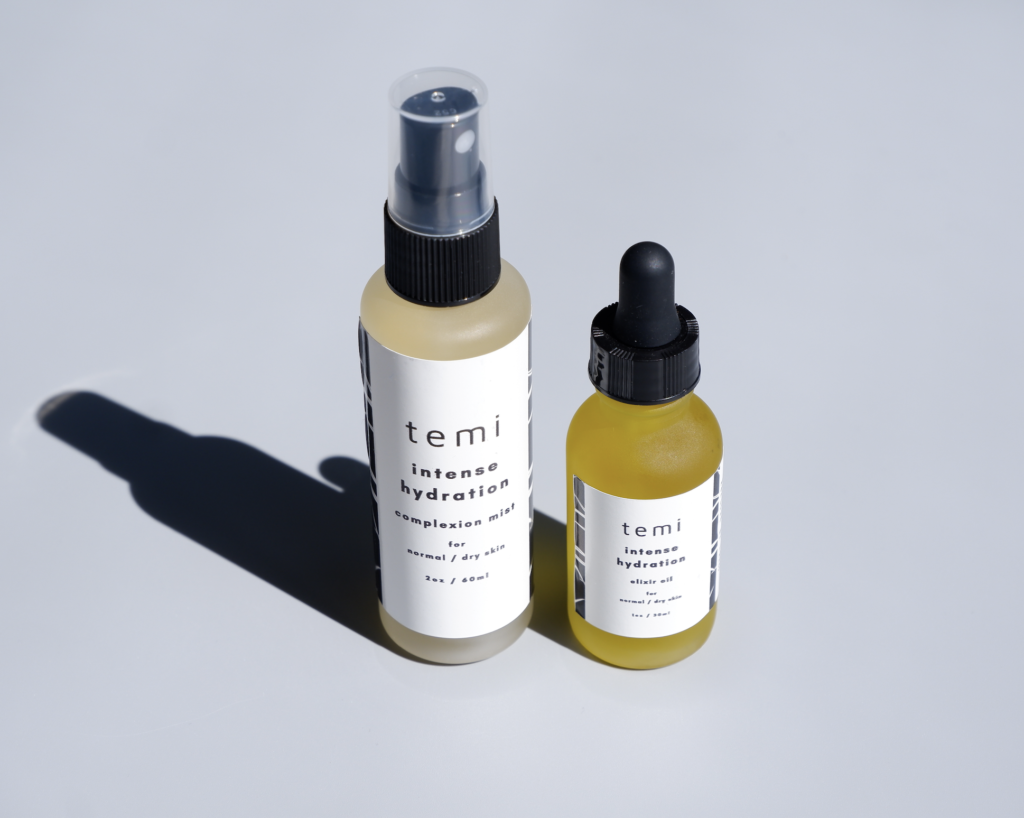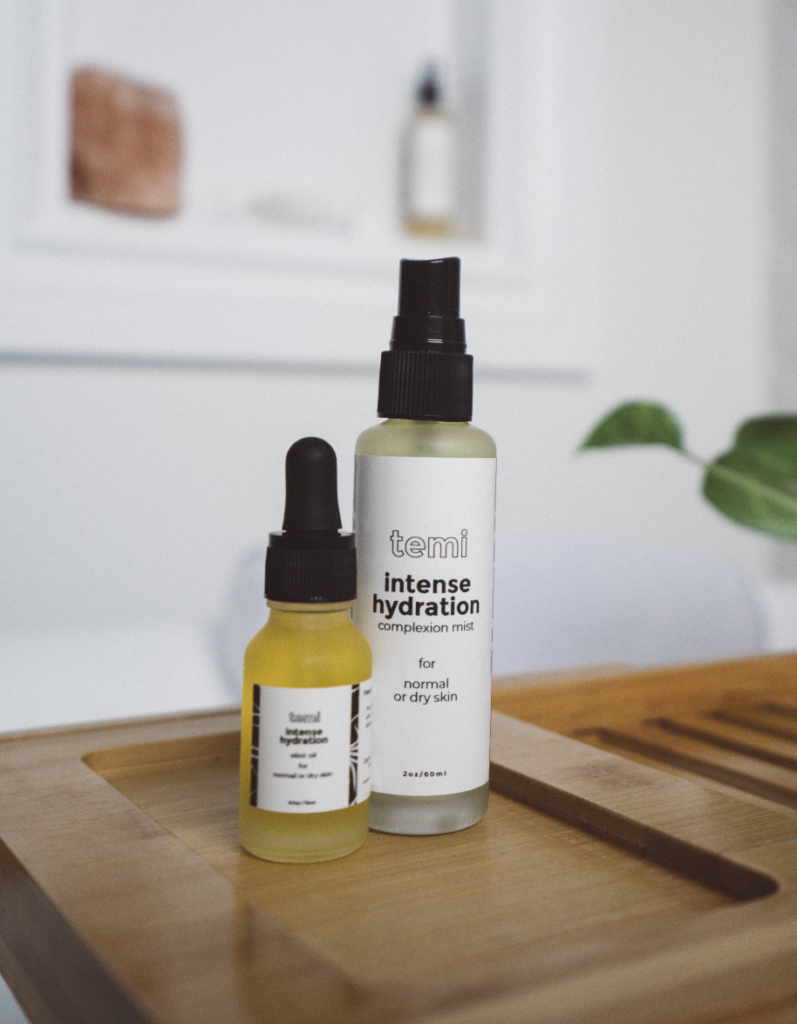With a lifelong passion for makeup and skincare, Témi Shobowale, CEO of Essentials by Temi and makeup artist, followed her entrepreneurial dreams and started her own skincare brand. Establishing herself in the beauty industry at a young age, Shobowale held different positions in the beauty industry, allowing her to enhance and showcase her skills and knowledge. Launched in 2019, Essentials by Temi offers organic and vegan small-batch luxury skincare essentials. Here, Shobowale shares her story of creating her beauty brand, and the struggles of running a successful brand as a Black entrepreneur.
When did your love affair with beauty begin?
“I’ve always been obsessed with the beauty industry since I was a kid. I hear stories from my uncles, aunts, and siblings, who tell me I used run around in my moms heels, with her Dior red lipstick all over my face. My mom travelled a lot—this was back when we were in Nigeria—and she’d come home with a lot of beauty products, perfume, and of course J’adore perfume–she was a big Dior fan. And when my mother would travel, we’d sometimes go to the village to see our grandmother, and she’d teach us how to make coconut oil from scratch, or palm oil from scratch—I cherished that and it helped my way of formulating and working with different ingredients.”
Become an S Insider
The latest in fashion, beauty, design, and arts & culture.
What is the philosophy behind Essentials by Temi?
“I started with body because I wanted to create a product that I could use all over. At the time I was obsessed with shea butter and I was trying to go back to my roots. And the multi-purpose nature of shea butter made me want to create similar products, which started the concept of Essentials by Temi. I always wondered why we had to use a serum for this and another product for that—I wanted to create something that’s simple and pure. The niche for me is high quality ingredients and that’s what a lot of brands don’t do, they focus more on branding and marketing, and packaging, and Essentials by Temi is about the actual quality.”

What are some products that you saw gaining popularity this past year?
“The facial essentials duo is top selling right now. It’s a duo that works together perfectly, you can buy it separately—I don’t try to push it on people, but I know why I created it, I know what it does for the skin texture, and how it helps you retain moisture. The great thing about my brand is that it has an element of aromatherapy, and when I want to moisturize my skin and I want to feel good, a little spritz of radiance complexion goes a long way. You breathe in and breathe out and you feel amazing, and you have this lemongrass, which a very grounding scent.”
Why is it difficult for BIPOC led beauty brands to gain notoriety and traction in the beauty space?
“I’m going to speak for myself but also speak for Black and other women of colour, especially Black female entrepreneurs, because I know other Black women who have their own skincare brand. Let’s say, you didn’t grow up in a lifestyle where you had the privilege to learn about financial literacy or come from money, so you’re kind of catching up, let’s say you ruined your credit and now you want to start a company and you’re just like ‘I don’t know where to start’, ‘where are the resources?’, ‘who can help me?’ and so on. You’re sitting around having to find a way all by yourself. You’re thinking ‘I’m working 9 to 5 and living paycheque to paycheque,’ but you have this dream and you want to make it happen. That was a really big thing for me because I always had three or four jobs at a time, and I’m a professional makeup artist, so I faced a lot of obstacles along the way of having to change jobs or lose jobs because it wasn’t flexible enough for my lifestyle and what I was trying to create for myself. To simply put it, funding is a big thing, because we really do not have access to funding—and it blows my mind. When you watch things like shark tank, and Dragons’ Den and see the The Lip Bar company, and how the judges basically shut them down, and look at where they are today. They skyrocketed and are carried at Target.”
How do you use your journey to empower other women looking to start their own business?
“Aside from being a makeup artist, I am the founder of HERDAY, where I organize female empowerment experiences and events. I’m all about wellness, female entrepreneurship, and empowerment, that’s a big thing for me. There’s so many female entrepreneurs out here and so many Black female entrepreneurs who don’t receive the same kind of love and investment that they deserve, to really build something that’s great and it’s needed.”

As a makeup artist who’s been working in the industry for years, why do you think some non BIPOC makeup artists find it difficult to adapt with the changes in the beauty industry and diversify their kits?
“As a Black makeup artist, we have to know how to do Black people’s makeup, as well as white people’s makeup—we have to be well-versed on all ethnicities. We always have to do twenty times the work, yet it’s the Black makeup artist that’s contacted and gets the smaller budget or smaller fee. And we have to do hair and makeup, which brings me to a whole other topic of agencies—especially agencies in Toronto—that represent professionals, they’re not diverse at all. I just want to see the longevity of the changes that we are going through right now, because this is just the beginning.”
How do you keep motivated during divisive times?
“I’m a pretty focused person all together, and I am also a very spiritual person—I’m all about wellness. And it took a lot from me over the years, I worked four to five jobs, I lived my entire life being burnt-out all the time. It came to a point where I literally had a spiritual awakening and I had to learn how to ground myself and keep myself grounded. I do a lot of things like meditating, Kundalini yoga, using affirmations, and just disconnecting and connecting more with nature.”
What are some steps people and brands can take to keep the momentum going and strive for a more inclusive and equal future?
“It’s simply the same thing Jackie Aina said, basically just ‘pull up or shut up.’ That’s literally all we need right now, and that’s why a lot of Black people are silent—we’ve been speaking about this for so long. You see so many things, I reposted something the other day of Elon Musk talking about criminalization of marijuana and how Black people are still sitting in jail, and someone commented and said ‘we’ve been saying this since they’ve legalized it’, so why are we now just being heard? We don’t have the energy to keep teaching the same thing over and over again, so yeah, it’s time for the white allies to start speaking—it’s time. What you need to continue doing is supporting us, hire us, don’t hire your best friends dads daughter and trying to keep it in the family, it’s time to hire the people that are right for the job. The people who have experience and the people who have the vision. Hire us. Buy from Black businesses, and understand that when you buy from a Black business—which is usually a small business—you’re literally trickling down the Black dollar and creating generational wealth that has been in the white community for so long. We deserve that.”
Are there any writers and scholars you suggest for those wanting to expand their knowledge on the Black experience and become better allies of the movement?
“Jill Andrew, she’s part of NDP party and represents MPP for Toronto-St.Paul’s, and she’s been doing an amazing job, for years now. She founded the Body Confidence Awards, and she does so much activism. Another powerful voice is Keosha Love, she is the founder of Our Women’s Voices. The day she started, she had me on the first panel she had and I remember looking at her and I thinking ‘you are the future. You guys are going to be the ones who lead the revolution.’ From then until now, she’s never dropped a note. She does a lot, in bringing together the youth of Toronto and speaking, she’s also a poet on top of that—she’s great with words. And Yusra Khogali—she does a lot of activism in Toronto too.”
Feature image photographed by Gillian Mapp; lifestyle images by Candice Ferreira.

